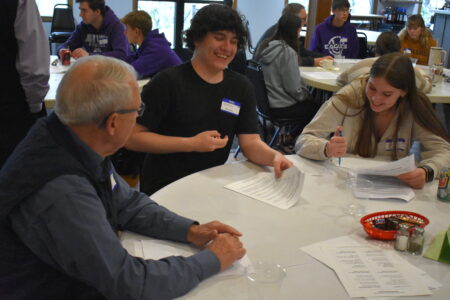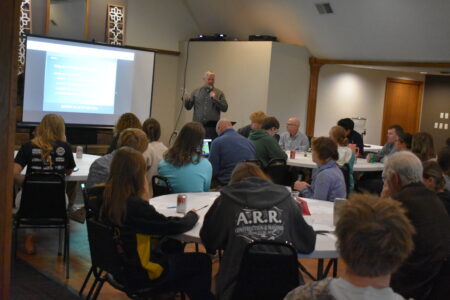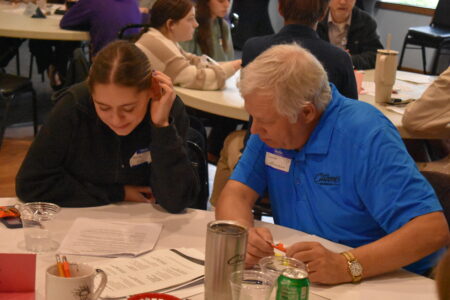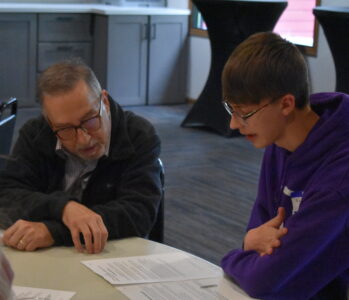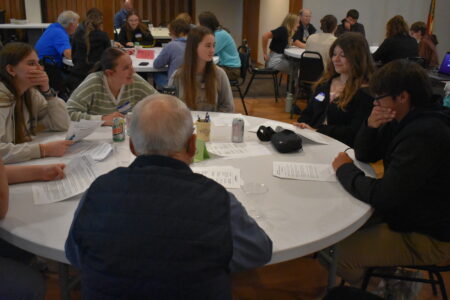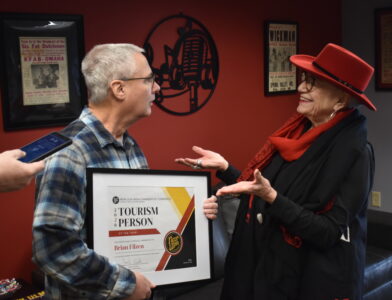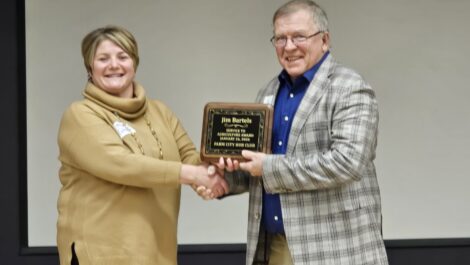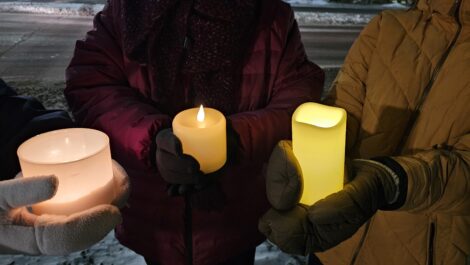Students get crash course in AI, business ethics
NU Rotary Club hosts annual ethics workshop
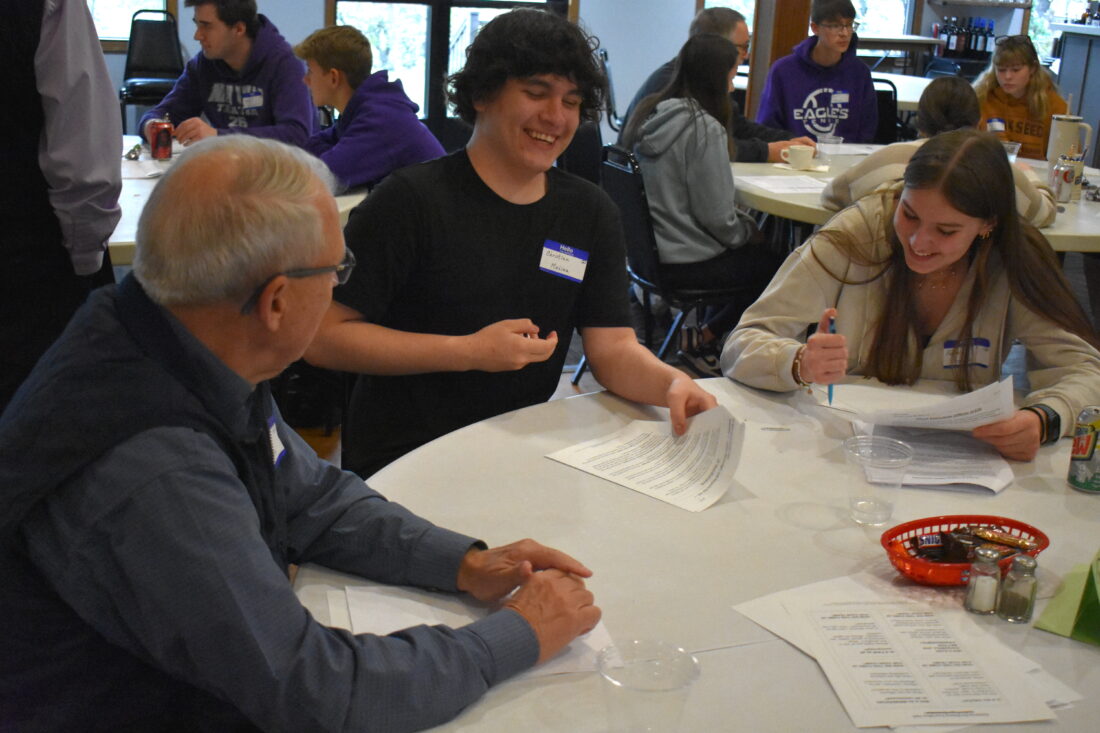
New Ulm Rotary member Bill Steinke lead a table of area high school students during an exercise on business ethics during the annual Rotary Club ethics workshop. The students were given a fictional scenario involving a company facing ethical dilemmas. Each member of the group was given an executive role in the company. They had to work together to determine how best to address the ethical concerns facing an apparel company plagued by scandal. Christian Molina (center) was given the role of a vice president of manufacturing who allegedly misused company funds. Molina argued that it was only “alleged.” In photo left to right: Bill Steinke, Christian Molina and Abigail Sowers.
NEW ULM – Tuesday, students from New Ulm High School, Minnesota Valley Lutheran, Cathedral High School and River Bend participated in the New Ulm Rotary Club’s annual ethics workshop.
Each year, juniors and seniors from all four New Ulm high schools are invited to attend the workshop. This year, 43 students were able to attend. As part of the workshop, the students are divided into seven groups, each with a New Ulm Rotarian to provide guidance. In the groups, the students are given presented ethical scenarios to practice decision-making.
This year, New Ulm Rotary added a new series of ethical scenarios involving Artificial Intelligence (AI).
New Ulm Rotary member Steve Friese introduced the AI ethics discussion during the workshop session on different tools for students to respond to ethical dilemmas. At the close of the presentation, Friese spoke on the ethical implications presented by AI technology.
He asked, “How do ethical decisions factor into AI?”
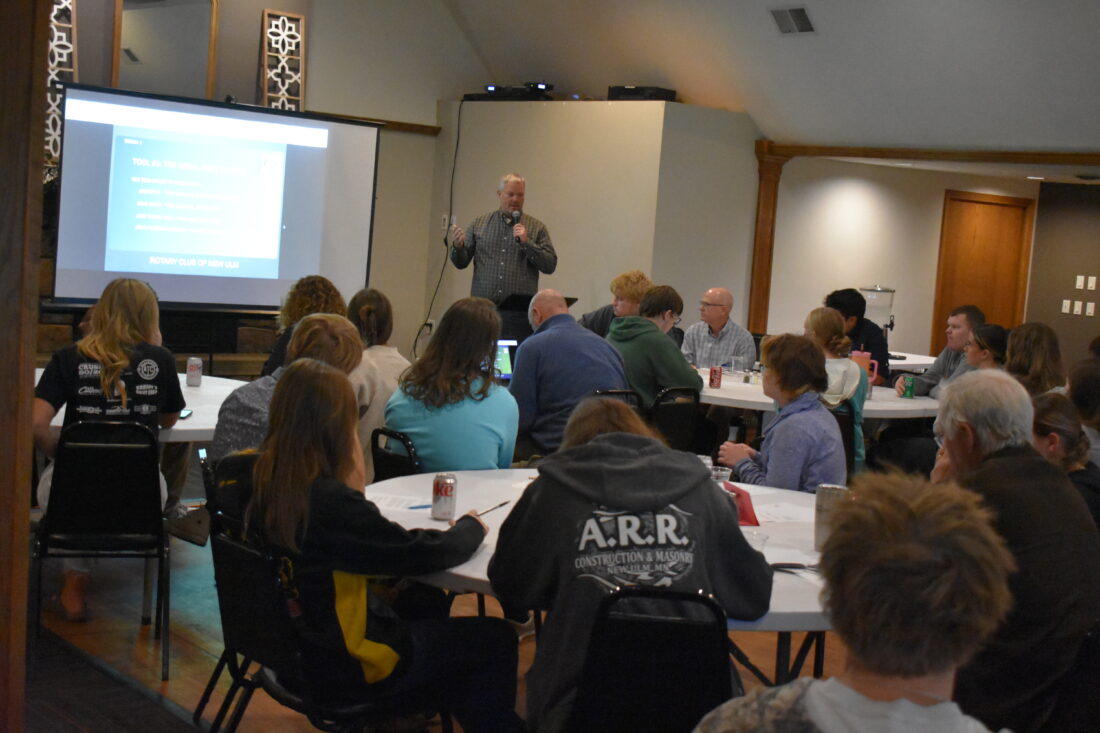
New Ulm Rotary Club member Steve Friese talks to the 43 students attending the club’s ethics workshop on the challenges of bringing human ethical decision-making to Artificial Intelligence (AI) technology.
Many of the AI tools require programming in order to make decisions, but these tools are also capable of learning. If an AI is not programmed with ethics or learns unethical behavior later, the real-world consequences could be extreme.
Friese directed students to the “Moral Machine,” an online platform designed to gather information on the human perspective on moral decisions made by machine intelligence.
The project started with the emergence of driverless vehicles. How do humans prepare self-driving cars to make decisions?
Friese said drivers make a lot of decisions. Many are simple like, turn left or right, but others can have major consequences that might not be clear to an AI driver.
As part of the exercise, students were given hypothetical scenarios in which an AI-driven vehicle experiences brake failure near a pedestrian crosswalk. The vehicle can either continue into its current lane or swerve into another lane. Each decision could result in injury or death for a pedestrian, but which is the ethical choice?
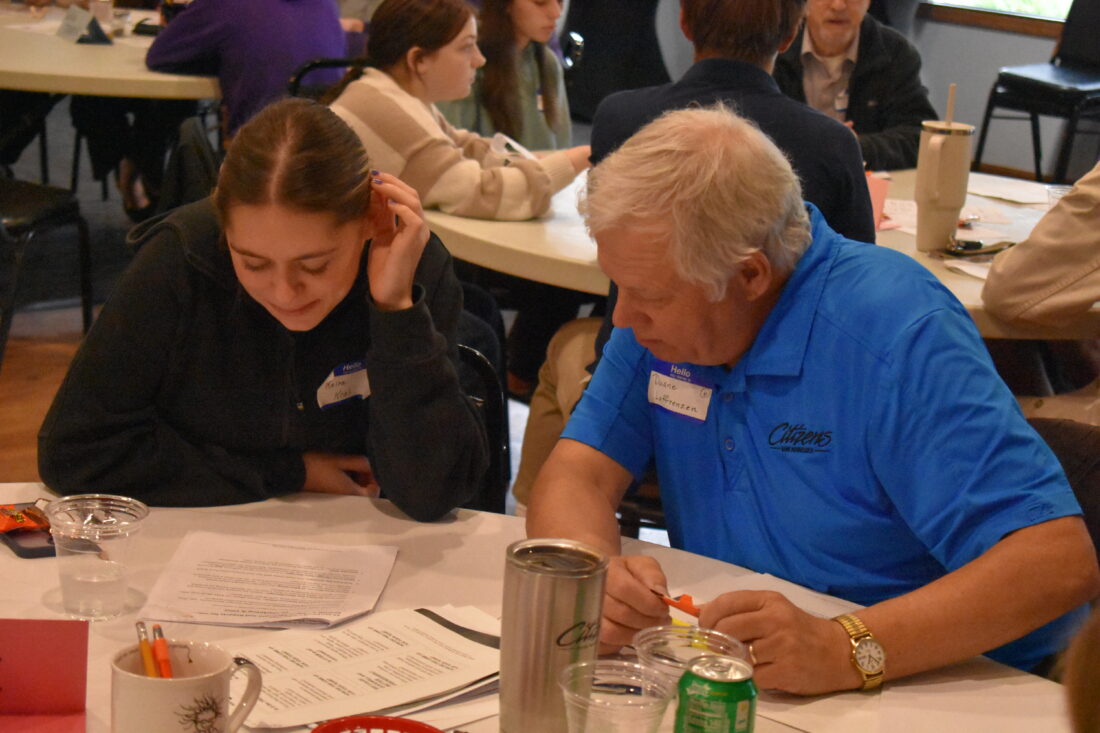
Area high school student Keira Kral and New Ulm Rotarian Duane Laffrenzen dig into a fictional scenario on business ethics during the club’s annual ethics workshop.
The students, divided into groups of seven, debated the ethics of the scenarios. Many of the groups tried to find loopholes in the dilemma to limit the loss of life. A common answer was to have the vehicle turn into a wall rather than hurt individuals.
Friese said the ethical AI questions were added to this year’s workshop because he believed it was an important issue to present to students.
“[AI] is something all the students are going to need to deal with for the rest of their lives,” Friese said. “I hope they take away from this workshop the challenges of integrating the human perspective into AI and how important that is.”
Later in the workshop, the student groups were given another fictional scenario involving a company facing ethical dilemmas. Each member of the group was given an executive role in the company. They had to work together to determine how best to address the ethical concerns facing an apparel company plagued by scandal.
In the scenario, the company was caught using child labor overseas, company data was hacked in a cyberattack, and the vice president of manufacturing was allegedly misusing company funds.
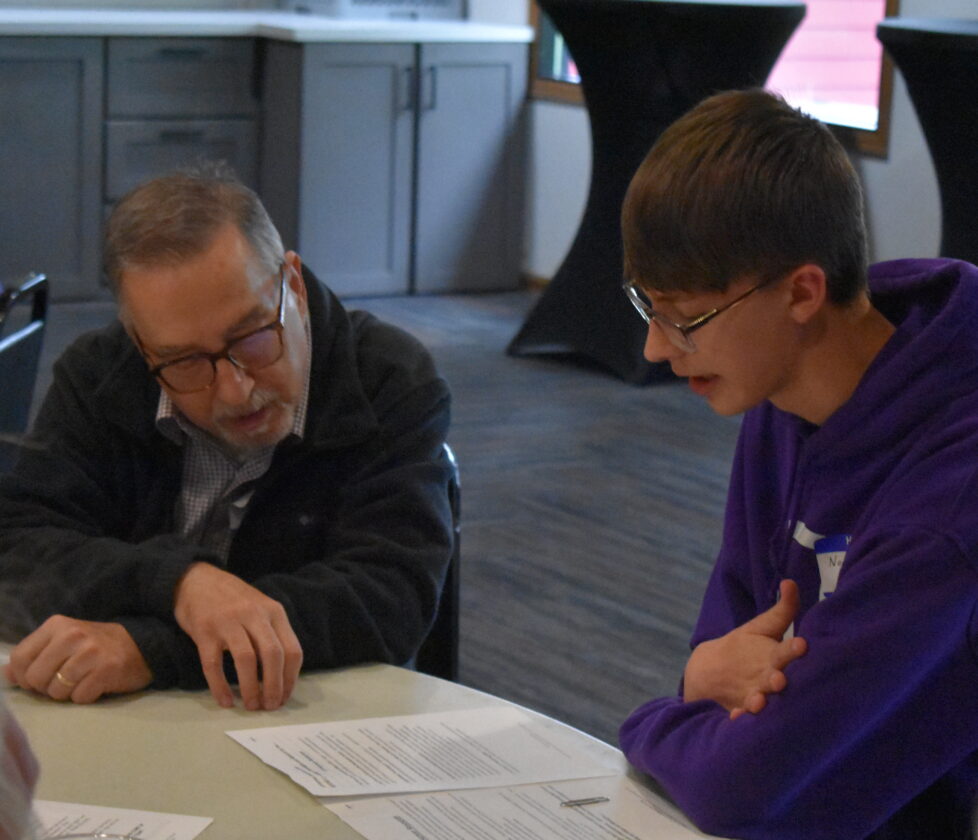
New Ulm Rotary Club member Kevin Sweeney goes over the business ethics material with high school student Noah Braun during the club’s annual ethics workshop.
This scenario was created by David Rodburne of St. Thomas University in 2002 and he continues to serve as a consultant for the Rotary Club ethics workshop. He estimated that around 7,000 Minnesota students have gone through the scenario over the last 23 years.
Rodburne said the scenario he created was fictional, but everything in the scenario had happened to a real-world business. In creating the scenario, he hopes to teach students how complex things can get in the business world.
“Many students just see business as a place to buy what they need,” he said. “They don’t understand what is going on behind the scenes and the many decisions being made to create and supply these products.”
Rodburne said his business ethics scenario is designed as a primer. For some large companies, his scenario would not be considered a crisis, but simply a bad day at the office.
For many of the students taking part in the program, it was an eye opening experience.
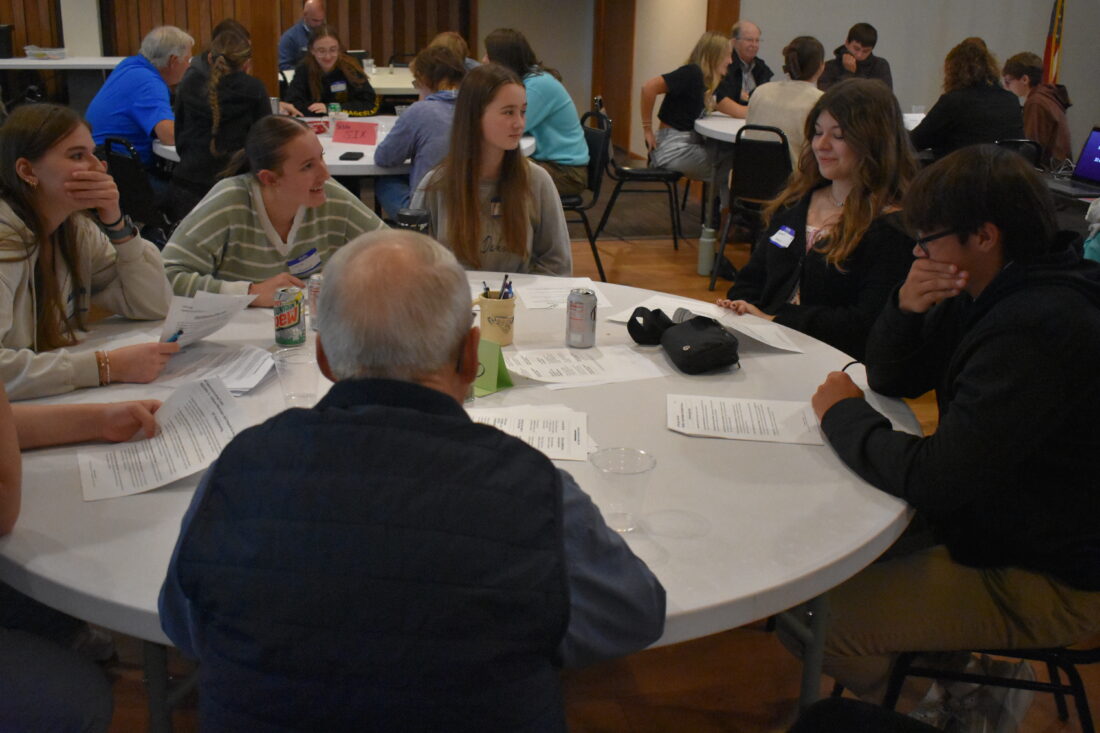
Students from the four New Ulm high school participated in the Rotary Club’s annual ethics workshop. The 43 area juniors and seniors were divided into small groups to practice making ethics based decision. Rotary Club member Bill Steinke served as moderator for group two as they discussed business ethics. In Photo left to right: Abigail Sowers, Emma Beranke, Bill Steinke, Sidney Janni, Savannah Seely and Henry Forst.
MVL senior Nora Grace said she found the ethics workshop to be very valuable.
“I think it is important to discuss these things,” she said. She especially appreciated the discussion about AI ethics because it was something that came up in day-to-day life. She said her school already had policies in place for how AI could be used in class.
“Even my parents are talking about AI,” she said. “Everyone needs to tools to look in on this.”
Christian Molina from River Bend Education District said the workshop was pretty fun. During the business ethics scenario, Molina took on the role of the VP of manufacturing for his group.
“My group decided to fire me,” Molina said.
He was quick to point out that in the scenario, it was only alleged that the VP was misusing funds. Molina was not sure if it was correct to fire him in this scenario.
Molina said his biggest takeaway from the session was how not everyone has the same perspective on ethics.
“It is important to think about that,” he said.
- New Ulm Rotary member Bill Steinke lead a table of area high school students during an exercise on business ethics during the annual Rotary Club ethics workshop. The students were given a fictional scenario involving a company facing ethical dilemmas. Each member of the group was given an executive role in the company. They had to work together to determine how best to address the ethical concerns facing an apparel company plagued by scandal. Christian Molina (center) was given the role of a vice president of manufacturing who allegedly misused company funds. Molina argued that it was only “alleged.” In photo left to right: Bill Steinke, Christian Molina and Abigail Sowers.
- New Ulm Rotary Club member Steve Friese talks to the 43 students attending the club’s ethics workshop on the challenges of bringing human ethical decision-making to Artificial Intelligence (AI) technology.
- Area high school student Keira Kral and New Ulm Rotarian Duane Laffrenzen dig into a fictional scenario on business ethics during the club’s annual ethics workshop.
- New Ulm Rotary Club member Kevin Sweeney goes over the business ethics material with high school student Noah Braun during the club’s annual ethics workshop.
- Students from the four New Ulm high school participated in the Rotary Club’s annual ethics workshop. The 43 area juniors and seniors were divided into small groups to practice making ethics based decision. Rotary Club member Bill Steinke served as moderator for group two as they discussed business ethics. In Photo left to right: Abigail Sowers, Emma Beranke, Bill Steinke, Sidney Janni, Savannah Seely and Henry Forst.

